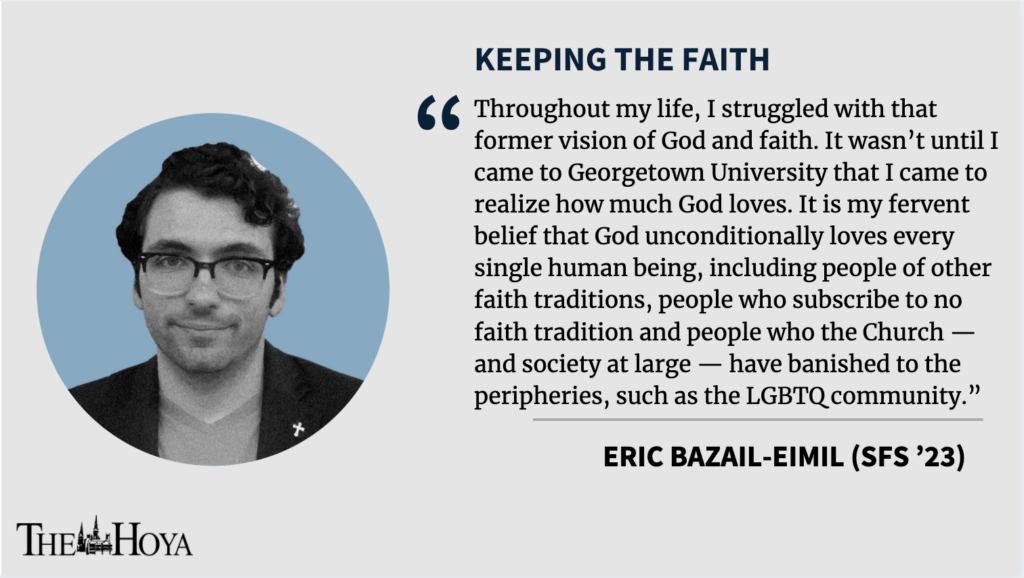“What unites all of our faiths is two things: peace and love.” When I attended Georgetown Admissions Ambassador Program weekend as a prospective student over two years ago, I remember hearing those words from Imam Yahya Hendi at a panel discussion about interreligious dialogue at Georgetown University.
When I applied to write this column back in January, I had no idea what I would write about. There are countless drafts in my Google Drive from those early stages as I tried to figure out what worked best. For me, writing this column wasn’t just about discussing important issues and their theological implications, but it was also motivated by what I felt called to write and learn about in the process. As I have discovered over the semester, I had a lot to learn about love. Unintentionally, every piece I wrote for this column has explored love and its myriad of incarnations, whether it be God’s love manifested through grace, the compassion we owe the most vulnerable and people who have wronged us, or the love and gentleness we owe ourselves in the face of change and societal pressures.
Maybe this trend shouldn’t have been much of a surprise. After all, love is what anchors Christian faith, bringing us closer to salvation and ultimate justification. Love guides the Christian mission and service to the world while also defining the obligations Christians have toward others. Not to mention, almost all other religious traditions value love as central parts of their theology. Then again, ask many people what they associate with Christianity, and they will often point to streetside preachers crying out about fire and brimstone. Indeed, many denominations of the faith are centered around the conception of humanity as “sinners in the hands of an angry God,” to borrow the words of colonial-era preacher Jonathan Edwards. Similar stories play out in other religious traditions.
Fringe groups often consume oxygen and media attention, painting a negative picture of religion that focuses excessively on rules and punishment and less on justice, compassion and empathy. This picture undermines the powerful contributions of faith groups in advocacy, community building and social work. Not only is it paramount that faith groups actively rebut these negative portrayals of religious communities, but it is also critical that people of faith center love in their spiritual practices and religious observance.
Throughout my life, I struggled with that former vision of God and faith. It wasn’t until I came to Georgetown that I came to realize how much God loves. It is my fervent belief that God unconditionally loves every single human being, including people of other faith traditions, people who subscribe to no faith tradition and people who the Church — and society at large — have banished to the peripheries, such as the LGBTQ community.
I believe in the God described in John’s Gospel, who “so loved the world, that he gave his only Son, that whoever believes in him should not perish but have eternal life.” John 3:16. I believe in a God who seeks us out every single day and invites us to live life for others and for his glory. I believe in a God that forgives our sins and calls us to love others as a sign of our faith. This God is the one I have tried to showcase in my writing these last few months.
I have thought about this more-loving God as I have reread C. H. Sisson’s translation of Dante Alighieri’s “The Divine Comedy” recently. Reading Paradiso, the work’s third section, for the first time since high school, I found myself marveling at the last stanza. As Dante experiences the Trinity in all its sublime glory and as his soul becomes fully liberated, he writes: “At this point high imagination failed / but already my desire and my will/ were being turned like a wheel, all at one speed, / by the love which moves the sun and the other stars.” Dante’s observation here is potent, indicating love is not only the core of faith but also the foundation upon which all of creation functions. Love truly is central in all respects.
As I have written this column and encountered these ideas, I have come to more fully appreciate and comprehend the central role love occupies in my own faith while embracing the often challenging obligation to love others. In a way, for a column titled “Keeping the Faith” and written by a Catholic student at a Jesuit university against the backdrop of the COVID-19 pandemic, existential shocks to our nation’s democracy and deep social division, no other theme would have been more appropriate.
My focus on God’s love throughout this column and in my spiritual practice does not mean I reject Catholicism’s teachings about repentance, atonement and the importance of honoring divine instruction about sin. Indeed, they are important facets of my personal relationship with God that keep me accountable and constantly aware of the distractions that seek to pull me away from my faith and inward. Instead, I anchor my faith and my relationship with God in the recognition that love is at the core of salvation. Through my prayer practices, my experiences of mindfulness and my conversations with others, I put that love first and foremost and work every day to put those ideas into practice. Seemingly, something was telling me to tell all of you about that love too.
Love is in short supply right now after over a year of the pandemic and continued disconnect. As we move into the more difficult limbo associated with healing, reconciling and uniting, putting love into practice will be even more important. As I close this column, one which I hope has comforted, inspired and challenged its readers, I urge you all to center love in your own spiritual practices and embody that love in your daily lives.
Eric Bazail-Eimil is a sophomore in the School of Foreign Service. Keeping the Faith appears online every other Friday.









